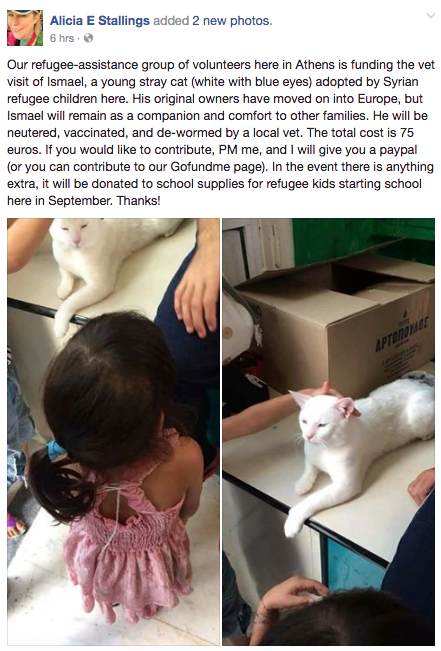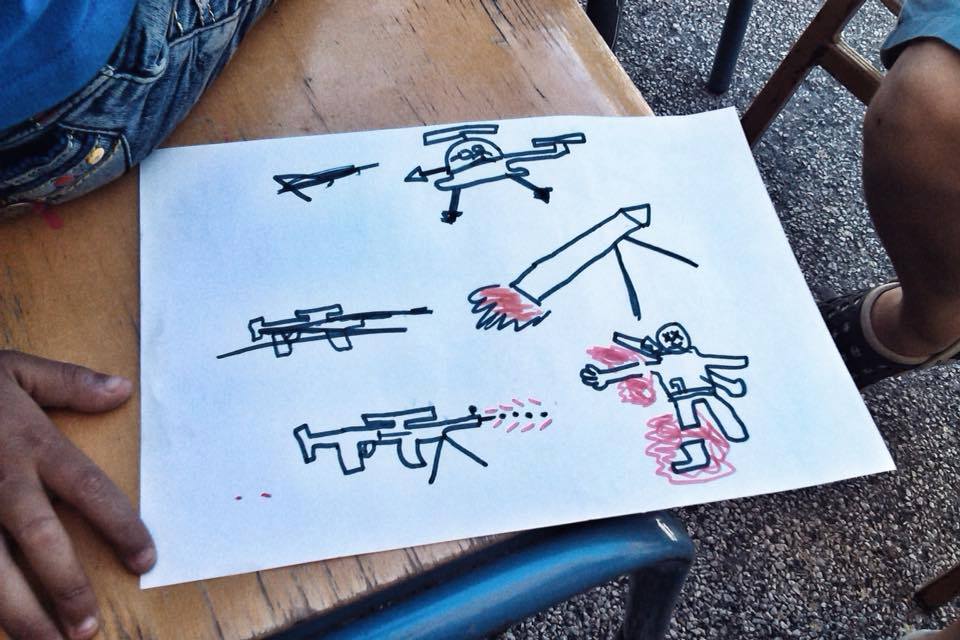
A girl named Aqdas recalls those lost at sea.
Migrants have arrived in Greece since Hesiod’s time. Certainly, tales of treacherous Aegean crossings fill the pages of Homer. The poet A.E. Stallings has been a student of the classics since her Oxford days, but Homer and Hesiod didn’t prepare her for the hands-on experience of volunteering with refugees during the disaster that has engulfed Europe.

An Afghan girl recalls drownings
My article on her heroic work with migrants, “Crossing Borders” is currently the lead story at the Poetry Foundation website. I met the Athens-based Alicia Stallings, a MacArthur “Genius” fellow, at last spring’s West Chester Poetry Conference, where we discussed her experience being at ground zero of the immigration crisis.
An excerpt:
She would meet refugees at the disembarking areas and, with her friends, pass out shoes and serve food. Facebook groups spread the news that 2,500 people had arrived at Piraeus, survivors of the dinghies that washed ashore at the Greek islands of Lesbos, Chios, and Samos, and were moving on to Athens. Or that 20 families had arrived in the port and needed sleeping bags, clean clothes, food.
“It was quite unreal. Two thousand people walking out of a war zone, with muddy feet, poorly dressed,” Stallings said. “Some with wounds, others in fur coats or rags. If you had anything you would wear it. Some people would be coming out with wheelchairs; some were carried out. Others came with a dog or cat. Some had a taxi waiting to take them to a hotel. Others would be walking to Hungary.”
These were the lucky ones. As Stallings wrote in an epigram with a title almost as long as the poem itself: “From an autopsy report of an unknown drowning victim, Ikaria”:
Female. Nine years old. Found wearing a blouse,
And a pair of sweatpants patched with Minnie Mouse.
 Epigrams were often the form she chose to express the horror and humanity of what was happening around her. “I wanted them to be sharp,” she explains. “Something that had distance, irony. The reality was too overwhelming for a sonnet. These are real people. The situation is bad enough that you don’t have to poetify,” she said, stressing the last word with a little self-mockery.
Epigrams were often the form she chose to express the horror and humanity of what was happening around her. “I wanted them to be sharp,” she explains. “Something that had distance, irony. The reality was too overwhelming for a sonnet. These are real people. The situation is bad enough that you don’t have to poetify,” she said, stressing the last word with a little self-mockery.
On land, the adults were bored and anxious, and the children more so. “The worst part is being in limbo and waiting. The uncertainty is really unbearable for people,” said Stallings. “This is their life. Instead of finishing their law degrees, they’re wearing ill-fitting shoes.” She remembered, in particular, a Syrian graduate student who felt his youth was being frittered away. From “The City”:
“I want to go to another land. I want to cross the border,”
The young man out of Syria said. “I’m tired of being stuck.
Sure, Greece is nice enough if you can get a job: good luck.”
“The saddest cases are men in their twenties. They don’t want to fight for Assad or ISIS. Their youth is being eaten—and they don’t know what will happen.”
Stallings and her friends brought supplies—crayons, Play-Doh, markers, bubbles, and pipe cleaners—to keep the restless kids busy as they waited day after day to learn their fate. “We’re the artists, we’re the painters, we’re the poets. We can do this,” she said. “I’m a mother; I can yell at kids in four languages.”
The Play-Doh, markers, and crayons ushered in a new era for the children. They may not have been eloquent in their native tongue, but were eloquent on paper. One drew a massacre he had witnessed and more than one drew those who have drowned at sea. Others illustrated bombings, one with the word “Assad” written on the aircraft. They made a case for immigration more heart-rending than any politician’s speeches.
Read the whole article here. Images courtesy A.E. Stallings and the “True Colors” Facebook page.

Children and adults are afraid of the sea now.

A Syrian boy recalls a school bombing.

The same Syrian boy recalls the maiming of a teacher at his school.

A child depicts a Turkish vessel firing a water cannon to try to sink a dinghy
Tags: A.E. Stallings, Hesiod, Homer

